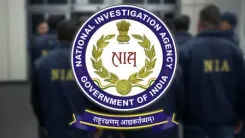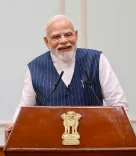What Commitment Did ADB President Masato Kanda Make During His Meeting With PM Modi?

Synopsis
Key Takeaways
- ADB pledges $10 billion for urban infrastructure in India.
- Investment targets municipal development and Metro extensions.
- Supports the Viksit Bharat 2047 vision.
- Focus on creating inclusive and sustainable growth.
- Collaboration with over 110 cities across 22 states.
New Delhi, June 1 (NationPress) Prime Minister Narendra Modi recently shared a photograph on X, documenting his meeting with Masato Kanda, the president of the Asian Development Bank (ADB), at his official residence. During this significant meeting, Kanda committed to a substantial investment of $10 billion aimed at enhancing urban infrastructure in India over the next five years.
This investment is envisioned to revolutionize urban infrastructure throughout the nation, focusing on municipal development, extending Metro services, establishing new Regional Rapid Transit System (RRTS) corridors, and modernizing urban services, as stated by ADB.
Kanda expressed his support for Modi's Viksit Bharat initiative, stating on X, “The vision for Viksit Bharat 2047 is ambitious, and the ADB stands behind this goal.”
PM Modi, while sharing the meeting's images, noted that he and Kanda discussed various topics, including India's remarkable transformation over the last decade, which has empowered and uplifted millions.
Masato Kanda, who commenced his official state visit to India last week as the ADB President, remarked, "By enhancing public and private sector financing, fostering knowledge partnerships, and mobilizing capital, we are prepared to assist India in its journey to become a developed nation by 2047, ensuring inclusive, resilient, and sustainable growth for its 1.4 billion citizens.”
The ADB has reportedly partnered with more than 110 cities across 22 states on initiatives related to water supply, sanitation, housing, and solid waste management, maintaining an active urban portfolio that includes 27 loans totaling $5.15 billion.
Previously, Kanda met with Finance Minister Nirmala Sitharaman to discuss strategies for enhancing rural prosperity, expanding rooftop solar capabilities, and operationalizing the UCF.
Additionally, he met with Urban Development Minister Manohar Lal Khattar to discuss forthcoming steps for directing private investment into urban projects.







